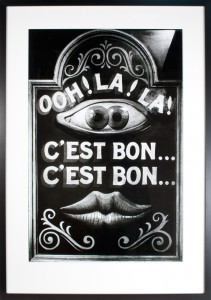It’s happening. Our time is Paris is about to expire. We will be here for another month, but people are starting to leave for summer trips. I can no longer pretend that we won’t have to say good-bye.
The person I will miss the most is my friend G. The other day, another friend, S., complimented my French, and I told her I have G. to thank. When I arrived here, my French was functional, grammatical, perfectly acceptable. But I was scared to open my mouth. I didn’t want to appear foolish by making mistakes.
Now I speak without fear. Even though G.’s English is impeccable, we speak French almost exclusively, even on the phone (which is the hardest), even with street noise in the background. She is patient and encouraging and puts me at ease.
Sure I made mistakes. G. gently corrected my dipthongs and gender mix-ups, taught me subtleties of slang, and explained cultural enigmas. Thanks to her, I now put my bread on the table instead of my plate and choose French chocolate (which has more cocoa versus butter) instead of Belgian. She’s explained the intricacies of French law, recommended French novels, baked me apple pies and introduced me to the joys of raclette, which is much better than fondue.
She has also made me realize that my inferiority complex is silly. So what if I have an American accent, as long as people can understand me? I’ve always considered French accents in English charming. So maybe my English accent isn’t as ugly as I thought.
I was surprised when G. told me that when she lived in America, she was concerned about making cultural gaffes, too. She even had a handbook for French expats on how to fit in in America. It hadn’t occurred to me that cultural understanding is a two-way street, that even French people can feel out of place and afraid of appearing foolish when they’re away from home and don’t understand the rules.
S. told me, “One thing you don’t mention in your blog is that being an American in France makes you exotic in a positive way. Different can also mean interesting.” She’s right, of course. We’re not still in middle school, yearning above all else to just blend in.
When I return to America, I will be a little bit braver. I’ll stop worrying about messing up. I’ll dare to stand out, even when I don’t need to.
Wish me bon courage. It’s a phrase that means both “good luck” but also “I hope you will have the courage to do what you need to.” Thanks to this year in France, thanks to my hugely warm and welcoming guide and friend, I think I will.

